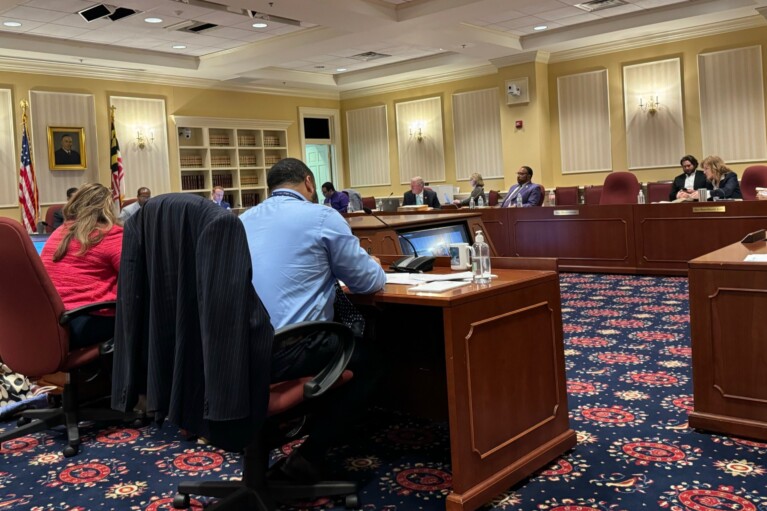House Police Reform Panel Recommends LEOBR Repeal, New Accountability Measures

The House Workgroup to Address Police Accountability in Maryland voted to recommend full repeal of the Law Enforcement Officers’ Bill of Rights at its final meeting Thursday.
“I was on a police reform group 20 years ago and we were not able to repeal [the LEOBR], so the idea that I’m here 20 years later actually getting it done — thank you,” Del. Debra Davis (D-Charles) said to workgroup Chairwoman Vanessa E. Atterbeary (D-Howard) after voting for repeal.
The recommendation passed on a 9-5 vote.
The Law Enforcement Officers’ Bill of Rights provides special due process protections for officers during internal investigations and lays out a fixed misconduct investigation process for all police departments in Maryland.
If that law is repealed through the next legislative session, law enforcement officers still would have the same due process rights that other public employees have, as outlined in the Maryland State Personnel and Pensions Code.
Maryland was the first state to enact a Law Enforcement Officers’ Bill of Rights, and is just one of 16 states that retain such a law.
“I would argue that Maryland provided the blueprint to America on how to protect corrupt and racist cops by passing the Law Enforcement Officers’ Bill of Rights and providing these kind of undue and unnecessary protections for law enforcement officers that ordinary citizens do not have,” said Del. Gabriel Acevero (D-Montgomery).

Del. Gabriel Acevero (D-Montgomery). Photo by Danielle E. Gaines.
“It continues to be a point of contention.”
Advocates and reform-minded lawmakers have been calling for a repeal of the Law Enforcement Officers’ Bill of Rights for years, and the cry has intensified as more instances of police violence have gained national attention.
Ahead of Thursday’s hearing, the ACLU of Maryland released a list of five “necessary police reforms,” cosigned by dozens of advocacy organizations across the state, which collectively have been dubbed the Maryland Coalition for Justice and Police Accountability.
The first demand on their list: “Repeal in full the Law Enforcement Officers’ Bill of Rights.”
“In the midst of the social unrest of the past few months, several demands have emerged as a consensus among those of us that have been pushing for true police accountability,” the coalition wrote in a statement. “Chief among these demands are changes to the Maryland Public Information Act that would disclose police investigatory records, and repeal of the Law Enforcement Officer Bill of Rights, which essentially allows police to police themselves.”
House lawmakers aren’t alone in their quest to strike the Law Enforcement Officers’ Bill of Rights. Last month, the Judicial Proceedings Committee held virtual bill hearings to mull over police reform legislation. Sen. Jill P. Carter (D-Baltimore City) introduced two draft bills: one seeking to repeal the controversial law; the other to reform it.
Law enforcement advocates have done a lot of hand-wringing over the possibility that the Law Enforcement Officers’ Bill of Rights might be repealed, wondering what the disciplinary process would look like across the state’s 148 police agencies.
Del. Michael A. Jackson (D-Prince George’s), the lone dissenting Democrat and the only member of the workgroup with a background in law enforcement, voted against the repeal.

Del. Michael Jackson (D-Prince George’s)
He said that there are “segments” of the law as it stands that he thinks are worth discussing and explaining to the public.
“I would really think that the public, who we serve, would be served better if they knew what pieces that we were looking at and things are explained to them,” Jackson, who was Prince George’s County sheriff from 2002 through 2010, said in explaining his vote. “Some know about LEOBR, some do not.”
Del. Jason Buckel (R-Allegany) agreed with Jackson, and added that repealing the Law Enforcement Officers’ Bill of Rights with no plan for a replacement would be foolish.
In another recommendation approved Thursday, the House workgroup laid out a series of accountability measures to be enacted if it is repealed.
Police reform and accountability for all
The workgroup finalized a list of 12 recommendations ahead of the next legislative session. Many of them reflect the Maryland Police Training and Standards Commission’s use of force best practices, and several echo bills drafted by members of the Senate Judicial Proceedings Committee.
Recommendation 1: Require all police departments to deploy body-worn cameras by Jan. 1, 2025. And agencies are to submit annual reports to the General Assembly regarding body camera acquisition.
-
Establish a duty to intervene on the part of law enforcement agents who witness excessive force“beyond what is objectively reasonable”;
-
Require each police department in Maryland to have a written policy stating that officers can use “objectively reasonable” force should the situation warrant it;
-
Order every law enforcement agency to have a written policy that states officers should exhaust every avenue to de-escalate conflict before force is employed;
-
Require officers to administer medical assistance to people injured because of an interaction with the police;
-
Require supervising officers to respond to the scene when a law enforcement agent has used physical force that results in the injury or death of a civilian;
-
Order that all instances where force is used must be documented;
-
Direct each department to have a written policy requiring supervisory review of use of force incidents;
-
Charge the Maryland Police Training and Standards Commission with creating an early warning system that every department must use to identify officers that exhibit patterns of problematic or forceful behavior;
-
Require officers to undergo training that would teach them skills they could use in the field that are less likely to lead to death or serious injury;
-
Require officers to sign sanctity of life pledges;
-
Order law enforcement agents to sign a document following the completion of their training signifying that they understand and will comply with the use of force statute;
-
Specify that officers may only use deadly force in the face of an imminent threat that may lead to the death or serious injury of themselves or a member of the public;
-
Require law enforcement to participate in less lethal force training;
-
Ban shooting at moving vehicles unless they are being used as a weapon;
-
Prohibit the use of chokeholds;
-
End the use of no-knock warrants unless the officer has demonstrated that they have attempted to employ less risky methods or that they may be in danger;
-
Ban law enforcement agencies from acquiring surplus weaponized or armored vehicles;
-
Establish that officers who violate the use of force statute are guilty of a misdemeanor crime punishable by up to 10-years imprisonment;
-
Designate the Maryland Police Training and Standards Commission as the agency responsible for holding departments accountable when the use of force statute is violated and allow the commission to decertify officers for infringing upon the statute. Decertified officers are to be documented in a decertification database maintained by the Maryland Police Training and Standards Commission;
-
Require that the Maryland Police Training and Standards Commission have 10 trained civilian members — four of whom are able to vote — and four members from the General Assembly without the power to vote;
-
Withhold Governor’s Office of Crime Control and Prevention funding from agencies that violate the use of force statute;
-
And prohibit agencies from hiring officers who were fired or resigned while under investigation for misconduct.

Police accountability workgroup Chairwoman Del. Vanessa E. Atterbeary (D-Howard) running that panel’s final meeting Thursday. Screenshot.
Recommendation 3: Require that police shootings be independently investigated.
Recommendation 4: Prohibit police unions from making collective bargaining agreements about disciplinary actions.
Recommendation 5: Require mental health screenings and assessments prior to hiring any officer and require officers to be reevaluated periodically by a certified mental health professional.
Recommendation 6: Prior marijuana use could no longer be used as a disqualifying factor in the hiring process for prospective officers.
Recommendation 7: Return control of the Baltimore City Police Department to the city.
Recommendation 8: Initiate a study to determine what types of calls for service can be diverted from police to other community resources.
Recommendation 9: Subject officers to periodic physical assessments.
Recommendation 10: Establish a scholarship for college students to take courses geared towards criminal justice. After graduating, scholarship recipients would be required to commit to serving as a law enforcement officer for a specified period of time.
Recommendation 11: Repeal the Law Enforcement Officers’ Bill of Rights.
Recommendation 12: Establish rules of accountability for law enforcement agencies to follow during internal investigations, including:
-
Requiring that civilians serve on officer’s trial boards;
-
Maintaining a transparent disciplinary process;
-
Using a charging committee akin to a grand jury that includes civilians;
-
Stripping officers who have been convicted of misdemeanor crimes or who have received probation before judgment of their right to a hearing board;
-
Creating an early warning system to identify officers that frequently exhibit problematic behavior;
-
Requiring each of Maryland’s 24 jurisdictions to establish a citizen complaint oversight board.
Before adjourning, Atterbeary said that the recommendations will be recorded and distributed to workgroup members for comment.
“I think we have made some really strong recommendations that are going to move Maryland forward in terms of police reform and police accountability for all — particularly minorities — here in the state of Maryland,” Atterbeary said.




 Creative Commons Attribution
Creative Commons Attribution